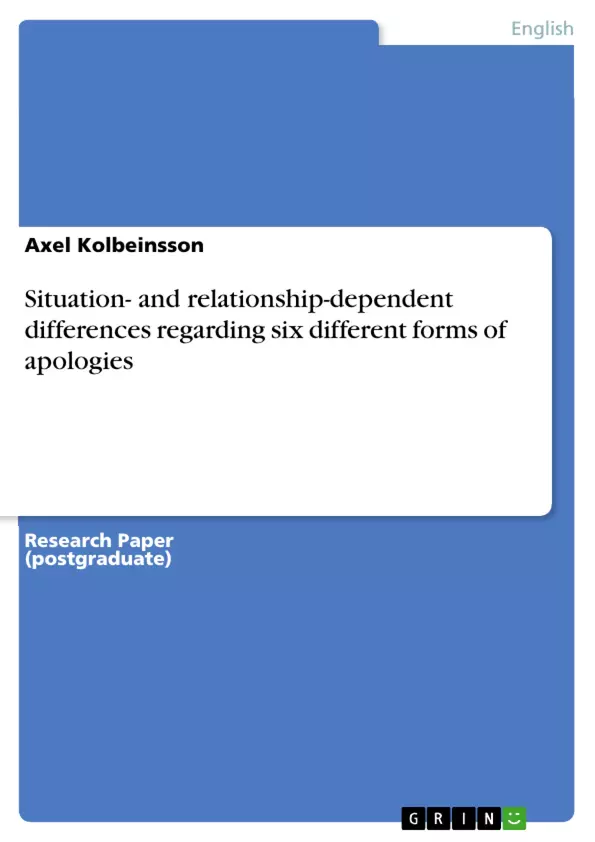Apologies as a form of politeness have been studied in various contexts over the last years. This paper aims to determine situation- and relationship-dependent differences regarding six different forms of apologies. To do so, a questionnaire containing 19 items was distributed online via social media to various groups of English speakers (N=36). The results partly conform with the existing literature of Deutschmann (2003), but also show that in power relations the need for an apology can come from both parties. Moreover, the most popular forms of apologies were explicit apologies and apologies + the offer of repair, supporting previous studies such as Holmes’ (1990). Due to the small sample and limited comparability, the results must be interpreted with caution and future research is needed to support the findings from the present study.
Inhaltsverzeichnis (Table of Contents)
- 1. Introduction and brief review of literature
- 2. The study
- 2.1. Sample
- 2.2. Method
- 3. Results
- 3.1. Discussion
- 3.2. Implications
- 3.3. Limitations
- 4. Conclusion and Prospects
Zielsetzung und Themenschwerpunkte (Objectives and Key Themes)
This research paper aims to investigate situation- and relationship-dependent differences regarding six different forms of apologies. The study uses a questionnaire to gather data from English speakers, analyzing their perceptions of apologies in various social contexts.
- Forms of apologies in different social settings
- Influence of power relations on apology strategies
- Impact of social distance on the minimization of responsibility in apologies
- Comparison of empirical findings with existing literature on apologies and politeness
- Cultural specific patterns of apologizing
Zusammenfassung der Kapitel (Chapter Summaries)
- 1. Introduction and brief review of literature: This chapter provides an overview of previous research on linguistic politeness, focusing on the concept of apologies as a specific form of politeness. It highlights key studies by Brown & Levinson and Holmes, exploring the factors influencing apology strategies, such as social distance and power relationships.
- 2. The study: This chapter describes the methodology and sample used in the research. It outlines the research questions, including the exploration of preferred apology types, the impact of power distance on apology choice, and the relationship between social distance and minimization of responsibility.
- 3. Results: This chapter presents the findings of the study, discussing the results of the questionnaire and analyzing the data collected. It includes a discussion of the implications of the findings, limitations of the study, and potential directions for future research.
Schlüsselwörter (Keywords)
The key keywords and focus topics of this research paper are: apologies, politeness, power relations, social distance, responsibility, linguistic politeness, Face-Threatening-Act, cultural specific patterns, apology strategies, minimization of responsibility.
Frequently Asked Questions
What factors influence the choice of an apology strategy?
According to the study, social distance and power relations between the parties are key factors in determining the form and necessity of an apology.
What were the most popular forms of apologies in the study?
Explicit apologies and apologies combined with an offer of repair were the most preferred forms among the participants.
Does power distance affect who needs to apologize?
The results show that in power relations, the need for an apology can arise from both parties, not just the subordinate one.
What is a "Face-Threatening-Act" in this context?
It refers to a linguistic act that potentially damages the self-image or "face" of the speaker or hearer, which an apology seeks to mitigate.
How was the empirical data collected?
A questionnaire with 19 items was distributed online via social media to a sample of 36 English speakers.
What is the relationship between social distance and responsibility?
The study explores whether increasing social distance leads to a higher tendency to minimize responsibility when apologizing.
- Quote paper
- Axel Kolbeinsson (Author), 2022, Situation- and relationship-dependent differences regarding six different forms of apologies, Munich, GRIN Verlag, https://www.grin.com/document/1191793



